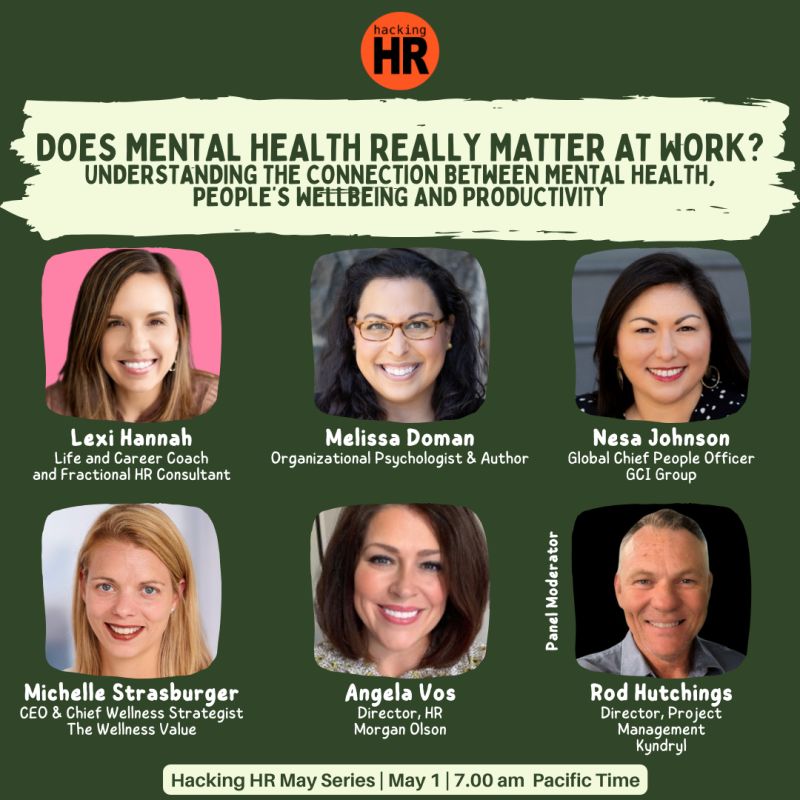Does Mental Health Really Matter at Work? Exploring the Connection at Hacking HR

On a recent Hacking HR panel, I had the pleasure of moderating a timely and critical discussion titled, Does Mental Health Really Matter at Work?. Mental health in the workplace is more than just about ensuring people feel happy—it’s about creating an environment where employees feel supported, safe, and understood. In today’s fast-paced world, mental health challenges are on the rise, making this conversation more important than ever.
To kick off the panel, I opened with a quote that resonates with this topic: “We’re not machines. We need rest, time, space, laughter, love, and perhaps most importantly, we need each other.” This sentiment really set the stage for our insightful discussion with a fantastic lineup of panelists, including Angela Vos, Nesa Johnson, Melissa Doman, and Michelle Strasburger.
Why Discussing Mental Health Is Essential
During the panel, we addressed the importance of talking about mental health at work. Melissa Doman pointed out that many companies are just starting to realize how vital this topic is, even though mental health has always been a crucial aspect of workplace wellbeing. She explained that leaders have the same impact on employees’ mental health as personal relationships, which drives home the need for open discussions at work. Angela Vos added that mental health isn’t just about making people “happy” at work—it’s about ensuring they have the tools to manage challenges and a culture that lets them openly share when they’re struggling.
Nesa Johnson highlighted the connection between psychological safety and innovation, showing that when employees feel safe, they can be more productive and creative. It’s not just about happiness—it’s about creating an environment that fosters trust and psychological safety.
Addressing Mental Health at Work: Practical Steps
One of the key questions posed to the panel was how companies can help employees manage their mental health. Michelle Strasburger shared her personal experience with workplace bullying and how it impacted her mental and physical health, including her fertility. She emphasized that employers must train leaders to have conversations about mental health, normalize these discussions, and provide resources.
Nesa stressed the importance of regular one-on-one conversations, where leaders take the time to check in with their employees on a deeper level. She suggested asking questions like, “How’s life?” or “What’s on your mind?” instead of the standard, “How are you?” Angela echoed this, emphasizing the need for leaders to model vulnerability and openness to create a culture where employees feel comfortable talking about their mental health.
Generational Differences in Addressing Mental Health
One particularly interesting aspect of the discussion revolved around how different generations handle mental health in the workplace. Michelle observed that younger generations, like Gen Z, are much more comfortable talking about mental health openly. She shared a story about her 13-year-old son, who, when getting his blood drawn, calmly told the nurse, “My anxiety is really spiking right now.” This is a clear sign that younger generations are more comfortable addressing their mental health compared to older generations, who were often taught to leave personal issues at the door.
Nesa pointed out that cultural differences also play a big role in how people approach mental health. In her experience, growing up in a Mexican-American household meant mental health wasn’t openly discussed. However, as she became more comfortable with the language of emotions, she saw the value in normalizing these discussions in the workplace.
The Role of HR in Supporting Mental Health
As HR professionals, we know we are not immune to mental health challenges ourselves. Angela discussed how critical it is for HR leaders to check in on their own mental wellbeing and encourage open, honest discussions with their teams. As she rightly said, “You can’t pour from an empty bucket.” Michelle emphasized the need for HR professionals to find allies and mentors, especially in organizations where they might feel unsupported.
Melissa Doman, who previously worked as a therapist, pointed out the fine line HR professionals walk when discussing mental health in the workplace. She explained that while HR teams aren’t mental health professionals, they can create an environment where employees feel safe to share what they’re comfortable with and seek the help they need.
Overcoming Misconceptions About Mental Health
Another important theme from the panel was overcoming the misconceptions surrounding mental health. Nesa noted that mental health challenges are often seen as a sign of weakness, which couldn’t be further from the truth. Melissa emphasized the importance of creating an environment where employees can talk about their mental health without fear of judgment or retribution.
There was also a great conversation around the idea that taking a day off for mental health doesn’t fix the problem if the workplace dynamics causing stress remain unchanged. It’s essential for organizations to focus on creating sustainable change that supports mental health beyond offering occasional mental health days.
You can watch a replay here:
Final Thoughts
As the panel came to a close, we all agreed that mental health at work is not just a passing trend—it’s a crucial element of creating a healthy, productive, and engaged workforce. Leaders and HR professionals alike must prioritize mental health by fostering open communication, normalizing discussions around mental wellbeing, and providing tangible resources for employees.
I would like to extend my heartfelt thanks to Angela Vos, Nesa Johnson, Melissa Doman, and Michelle Strasburger for their insights and contributions to this important conversation. Together, we are creating workplaces where mental health truly matters